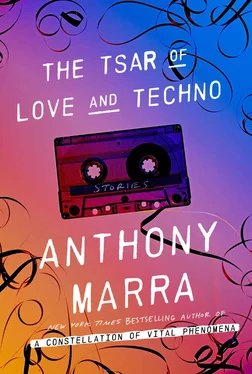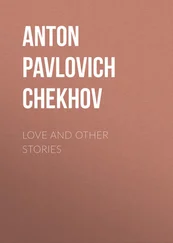She tried to coax him forward, but he leaned deeper into her arms.
“The shed and stone wall are rebuilt. Behind them the herb garden is replanted.” He built the image for her in short, declarative sentences, a habit he’d never fully surrender, even after sight was fully restored to her right eye. “It’s all here.”
“What wrong, then?” she asked.
“Where to begin?”
“What’s right, then?” she asked.
“That’s a trick question.”
She stroked the back of his neck, felt the downy hairs lift onto her finger pads. A gray bird in the sky twisted its shadow on the ground. The sunshine glowed off her cheeks. They rarely kissed in daylight.
In the afternoon, they went to the meadow with a shovel. Ruslan insisted he walk a dozen paces ahead, just in case. The minesweeping team had cleared twenty-three mines from the hill. The repacked hollows were no wider than manhole lids. Sunken among them were two explosion craters, one at the end of the herb garden, the other farther up the hill.
“I don’t know which is theirs,” he said. “I didn’t think there would be two.” He frowned and his hands shook slightly. He looked awed and frightened by what he didn’t know, how the scope of what he didn’t know widened by the day.
He climbed into each hole, sifted through the dirt for remains. He reached over the lip of the crater, deposited what he’d found on the grass, then went back under like a kid diving for coins. Patches of pink silk. A marbled brown button. The melted treads of a sandal. A shattered cassette tape. She fit the fractured plastic face to read its half-erased message: F r ol a In Case gency!!! Vol. 1.
With Ruslan’s trousers rolled to his knees, his hands and feet tanned with dirt, Nadya could so easily imagine him as the kind of boy whose mother was forever following with a broom. With nothing else to inter, he divided the artifacts into two piles and set one at the bottom of each crater. For the rest of the afternoon and into evening, he shoveled burgundy dirt into each. He had no bodies to bury, only holes to fill.
Over the following years, they spent spring and summer weekends at the dacha, the rest of the time in Grozny. With funds diverted from a dozen more-needed infrastructure projects, the Museum of Regional Art was rebuilt. Nadya returned as head of conservation. She completed her dissertation on the censor, Roman Markin, and created a website to catalog his falsified images.
One summer day a visitor arrived at the dacha. Young man. Shorn hair and jeans baggy enough to clothe six legs. Ruslan and Makka had been playing on the hill. Nadya watched the stranger approach with a map stretched between his hands. The map didn’t bend in the breeze. It was wrapped in a gold-leafed frame.
She tied her headscarf and waited for Ruslan before approaching.
“You look lost,” Ruslan said.
The young man glanced to the lush green steps ridging the far slope. The grasses of the empty pasture swayed with the light touch of wind on their tips. “It’s a peaceful place,” the young man said, now holding the framed map away from them. “Can you tell me if anyone died by a land mine here?”
Ruslan stepped to the young man and grabbed him by the back of the neck. The suddenness stunned Nadya.
“Time to explain yourself,” he said.
The young man lifted the map upright and only when its contours matched those of the hill did they recognize what it was.
In the living room, the young man explained himself over tea. He had been told his brother had died on the hill depicted in the painting and wanted to see the place for himself. When Ruslan asked how he’d come across the painting, he shook his head and smiled, as if to say life is well suited for nearly everything but explanation. “Have you ever seen Deceit Web ?” he asked.
Ruslan ran his fingers over the gilded frame, inhaled the musty coarseness of the canvas. Nadya observed him. Two manneristic figures, painted in black, ran toward the crest of the hill. Ruslan held his fingertips over them, as if testing them for warmth.
Nadya stayed inside with Makka while the two men climbed the hill.
“I was told two Russian soldiers were kept here during the war,” Ruslan said. “They rebuilt the place. Did a decent job, actually.” He broke off a sprig of mint leaf and passed it. The young man slid the leaf between his lips and tongued it across the roof of his mouth. They climbed to the two grave markers. “I found two mine craters when I returned here. One might be your brother’s.”
The young man dropped to one knee and unzipped his duffel bag. Nestled among underwear and balled socks lay three pickle jars, two filled with ashes, the third empty. He scooped a palmful of dirt into the empty one. “When we were kids, we’d pretend that the world was ending and he’d climb into a rocket ship and blast off into space.”
Ruslan squinted into the liquid shimmer of sunlight at the horizon. There was an explosion. His world had ended. He was still here.
“I guess I’ll go now,” the young man said.
Ruslan wasn’t finished. “Without the Zakharov.”
“Excuse me?”
“The painting. It stays.”
“But it’s mine.”
“This is where it belongs.”
The young man’s soft face hardened like a dollop of melted wax. “I’m going to leave now.”
Ruslan stepped near enough to smell the mint leaf wilting on the young man’s tongue. “As I see it, you have two options. You can sell it to me and I’ll give you a ride to the airport. Or I’ll take it from you and you can find your own way. You’re a long way from home in a land you don’t understand. Choose wisely.”
“Memory is the only true real estate,” the young man said. “Nabokov wrote that.”
“Good for him. What will it be?”
The young man studied the painting for another moment. “I’m sure I can get a poster of it,” he said. They looked back at the hill before returning inside. There wasn’t a shadow on it.
With three pickle jars and ten thousand U.S. dollars in his suitcase, the young man flew to a resort town on the Black Sea. For three days he ambled along the beaches, his feet sinking in brown sand, his pale cheeks baked to a permanent blush. That beach was nearer to the sun than any strip of land he’d ever known. On his fourth day, he shouldered his duffel bag and walked to the sand. He held a worn postcard and followed the shore until he stood on the spot the card depicted. No one would force him to sell the postcard. The heavily oiled, lightly clad swimmers might have wondered why the skinny young man in a leopard-print Speedo had gone into the water with three pickle jars. More likely, they didn’t notice him at all.
A wave tumbled him into a dusky green tunnel. Ropes of seawater uncoiled down his neck. The next wave broke gently over his torso. He backstroked with one arm. The other clasped the three jars to his chest. Silver schools darted at his side. There he was. He could barely believe it. When he’d swum far past the breakwater, so far he had the whole sea, from here to the horizon, all to himself, he unscrewed the jars and let them sink into the dark blue.
Sergei
He bought his father a smartphone for his birthday.
“I already have a telephone,” his father said. “It’s connected by cords to the wall so it can’t be lost or stolen. You tell me whose phone is smarter.”
“I got it for the camera. Look,” Sergei said. He pressed the power button and the phone chirped to life. “There’s two camera lenses. One pointing out, one back at you.”
“We live in troubling times.”
“It’s for selfies. So…”
His father scowled. “Don’t be vulgar.”
Sergei crossed the room to the wall of his father’s portraits. Whenever he wanted to discuss a difficult subject, he addressed it to one of the more sympathetic photographs of his father. “Bit optimistic, leaving all this extra space, no?” he asked, nodding to the bare wall that stretched beyond the last framed photograph.
Читать дальше












